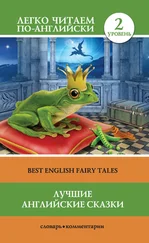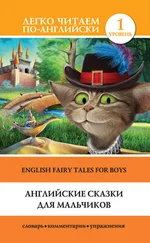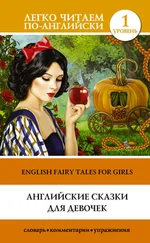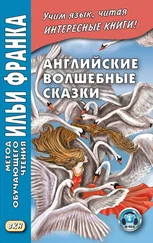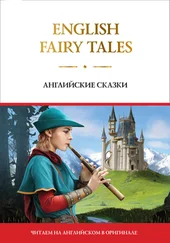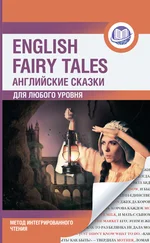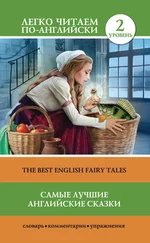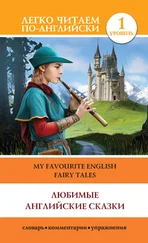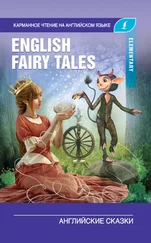Joseph Jacobs - More English Fairy Tales
Здесь есть возможность читать онлайн «Joseph Jacobs - More English Fairy Tales» весь текст электронной книги совершенно бесплатно (целиком полную версию без сокращений). В некоторых случаях можно слушать аудио, скачать через торрент в формате fb2 и присутствует краткое содержание. Год выпуска: 1894, Жанр: Сказка, на английском языке. Описание произведения, (предисловие) а так же отзывы посетителей доступны на портале библиотеки ЛибКат.
- Название:More English Fairy Tales
- Автор:
- Жанр:
- Год:1894
- ISBN:нет данных
- Рейтинг книги:5 / 5. Голосов: 1
-
Избранное:Добавить в избранное
- Отзывы:
-
Ваша оценка:
- 100
- 1
- 2
- 3
- 4
- 5
More English Fairy Tales: краткое содержание, описание и аннотация
Предлагаем к чтению аннотацию, описание, краткое содержание или предисловие (зависит от того, что написал сам автор книги «More English Fairy Tales»). Если вы не нашли необходимую информацию о книге — напишите в комментариях, мы постараемся отыскать её.
Illustrated by John D. Batten.
Book text and illustrations are taken from the site www.gutenberg.org
More English Fairy Tales — читать онлайн бесплатно полную книгу (весь текст) целиком
Ниже представлен текст книги, разбитый по страницам. Система сохранения места последней прочитанной страницы, позволяет с удобством читать онлайн бесплатно книгу «More English Fairy Tales», без необходимости каждый раз заново искать на чём Вы остановились. Поставьте закладку, и сможете в любой момент перейти на страницу, на которой закончили чтение.
Интервал:
Закладка:
The second daughter next says to her mother: “Mother, bake me a bannock, and roast me a collop, for I’m going away to seek my fortune.” Her mother did so; and away she went to the old wife, as her sister had done. On the third day she looked out of the back-door, and saw a coach-and-four coming along the road. “Well,” quoth the old woman, “yon’s for you.” So they took her in, and off they set.
The third daughter says to her mother: “Mother, bake me a bannock, and roast me a collop, for I’m going away to seek my fortune.” Her mother did so; and away she went to the old witch. She bade her look out of her back-door, and see what she could see She did so; and when she came back, said she saw nought. The second day she did the same, and saw nought. The third day she looked again, and on coming back said to the old wife she saw nought but a great Black Bull coming crooning along the road. “Well,” quoth the old witch, “yon’s for you.” On hearing this she was next to distracted with grief and terror; but she was lifted up and set on his back, and away they went.
Aye they travelled, and on they travelled, till the lady grew faint with hunger. “Eat out of my right ear,” says the Black Bull, “and drink out of my left ear, and set by your leaving.” So she did as he said, and was wonderfully refreshed. And long they rode, and hard they rode, till they came in sight of a very big and bonny castle. “Yonder we must be this night,” quoth the Bull; “for my elder brother lives yonder;” and presently they were at the place. They lifted her off his back, and took her in, and sent him away to a park for the night. In the morning, when they brought the Bull home, they took the lady into a fine shining parlour, and gave her a beautiful apple, telling her not to break it till she was in the greatest strait ever mortal was in the world, and that would bring her out of it. Again she was lifted on the Bull’s back, and after she had ridden far, and farther than I can tell, they came in sight of a far bonnier castle, and far farther away than the last. Says the Bull to her: “Yonder we must be this night, for my second brother lives yonder;” and they were at the place directly. They lifted her down and took her in, and sent the Bull to the field for the night. In the morning they took the lady into a fine and rich room, and gave her the finest pear she had ever seen, bidding her not to break it till she was in the greatest strait ever mortal could be in, and that would get her out of it. Again she was lifted and set on his back, and away they went. And long they rode, and hard they rode, till they came in sight of the far biggest castle and far farthest off, they had yet seen. “We must be yonder to-night,” says the Bull, “for my young brother lives yonder;” and they were there directly. They lifted her down, took her in, and sent the Bull to the field for the night. In the morning they took her into a room, the finest of all, and gave her a plum, telling her not to break it till she was in the greatest strait mortal could be in, and that would get her out of it. Presently they brought home the Bull, set the lady on his back, and away they went.
And aye they rode, and on they rode, till they came to a dark and ugsome glen, where they stopped, and the lady lighted down. Says the Bull to her: “Here you must stay till I go and fight the Old One. You must seat yourself on that stone, and move neither hand nor foot till I come back, else I’ll never find you again. And if everything round about you turns blue, I have beaten the Old One; but should all things turn red, he’ll have conquered me.” She set herself down on the stone, and by-and-by all round her turned blue. Overcome with joy, she lifted one of her feet, and crossed it over the other, so glad was she that her companion was victorious. The Bull returned and sought for her, but never could find her.
Long she sat, and aye she wept, till she wearied. At last she rose and went away, she didn’t know where. On she wandered, till she came to a great hill of glass, that she tried all she could to climb, but wasn’t able. Round the bottom of the hill she went, sobbing and seeking a passage over, till at last she came to a smith’s house; and the smith promised, if she would serve him seven years, he would make her iron shoon, wherewith she could climb over the glassy hill. At seven years’ end she got her iron shoon, clomb the glassy hill, and chanced to come to the old washerwife’s habitation. There she was told of a gallant young knight that had given in some clothes all over blood to wash, and whoever washed them was to be his wife. The old wife had washed till she was tired, and then she set her daughter at it, and both washed, and they washed, and they washed, in hopes of getting the young knight; but for all they could do they couldn’t bring out a stain. At length they set the stranger damsel to work; and whenever she began, the stains came out pure and clean, and the old wife made the knight believe it was her daughter had washed the clothes. So the knight and the eldest daughter were to be married, and the stranger damsel was distracted at the thought of it, for she was deeply in love with him. So she bethought her of her apple and breaking it, found it filled with gold and precious jewellery, the richest she had ever seen. “All these,” she said to the eldest daughter, “I will give you, on condition that you put off your marriage for one day and allow me to go into his room alone at night.” The lady consented; but meanwhile the old wife had prepared a sleeping drink, and given it to the knight who drank it, and never wakened till next morning. The live-long night the damsel sobbed and sang:
“Seven long years I served for thee,
The glassy hill I clomb for thee,
Thy bloody clothes I wrang for thee;
And wilt thou not waken and turn to me?”
Next day she knew not what to do for grief. Then she broke the pear, and found it filled with jewellery far richer than the contents of the apple. With these jewels she bargained for permission to be a second night in the young knight’s chamber; but the old wife gave him another sleeping drink, and again he slept till morning. All night she kept sighing and singing as before:
“Seven long years I served for thee,
The glassy hill I clomb for thee,
Thy bloody clothes I wrang for thee;
And wilt thou not waken and turn to me?”
Still he slept, and she nearly lost hope altogether, But that day, when he was out hunting, somebody asked him what noise and moaning was that they heard all last night in his bedchamber. He said: “I have heard no noise.” But they assured him there was; and he resolved to keep waking that night to try what he could hear. That being the third night and the damsel being between hope and despair, she broke her plum, and it held far the richest jewellery of the three. She bargained as before; and the old wife, as before, took in the sleeping drink to the young knight’s chamber; but he told her he couldn’t drink it that night without sweetening. And when she went away for some honey to sweeten it with, he poured out the drink, and so made the old wife think he had drunk it. They all went to bed again, and the damsel began, as before, singing:
“Seven long years I served for thee,
The glassy hill I clomb for thee,
Thy bloody clothes I wrang for thee;
And wilt thou not waken and turn to me?”
He heard, and turned to her. And she told him all that had befallen her, and he told her all that had happened to him. And he caused the old washerwife and her daughter to be burnt. And they were married, and he and she are living happy to this day for aught I know.
Yallery Brown
Once upon a time, and a very good time it was, though it wasn’t in my time, nor in your time, nor any one else’s time, there was a young lad of eighteen or so named Tom Tiver working on the Hall Farm. One Sunday he was walking across the west field, ’t was a beautiful July night, warm and still and the air was full of little sounds as though the trees and grass were chattering to themselves. And all at once there came a bit ahead of him the pitifullest greetings ever he heard, sob, sobbing, like a bairn spent with fear, and nigh heartbroken; breaking off into a moan and then rising again in a long whimpering wailing that made him feel sick to hark to it. He began to look everywhere for the poor creature. “It must be Sally Bratton’s child,” he thought to himself; “she was always a flighty thing, and never looked after it. Like as not, she’s flaunting about the lanes, and has clean forgot the babby.” But though he looked and looked, he could see nought. And presently the whimpering got louder and stronger in the quietness, and he thought he could make out words of some sort. He hearkened with all his ears, and the sorry thing was saying words all mixed up with sobbing—
Читать дальшеИнтервал:
Закладка:
Похожие книги на «More English Fairy Tales»
Представляем Вашему вниманию похожие книги на «More English Fairy Tales» списком для выбора. Мы отобрали схожую по названию и смыслу литературу в надежде предоставить читателям больше вариантов отыскать новые, интересные, ещё непрочитанные произведения.
Обсуждение, отзывы о книге «More English Fairy Tales» и просто собственные мнения читателей. Оставьте ваши комментарии, напишите, что Вы думаете о произведении, его смысле или главных героях. Укажите что конкретно понравилось, а что нет, и почему Вы так считаете.

